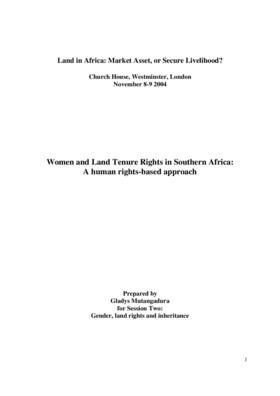Land in Africa: Market Asset, or Secure Livelihood? Church House, Westminster, London November 8-9 2004 Women and Land Tenure Rights in Southern Africa: A human rights-based approach
Document begins: Land in Africa: Market Asset, or Secure Livelihood? Church House, Westminster, London November 8-9 2004 Women and Land Tenure Rights in Southern Africa: A human rights-based approach Prepared by Gladys Mutangadura for Session Two: Gender, land rights and inheritance 1 Women and Land Tenure Rights in Southern Africa: A human rights-based approach Gladys Mutangadura1 Abstract Land is considered the most fundamental resource to women's living conditions, economic empowerment and, to some extent, their struggle for equity and equality. More than 60% percent of women in Southern Africa are dependent on land for their livelihoods. Despite the importance of land to women in the sub-region, their land rights are still largely discriminated against. A combination of statutory and customary laws favoring male ownership of property disadvantage women's rights to own land. The traditional exclusion of women from property and land ownership on gender grounds is the most damaging global human rights violation experienced in many developing countries. Without rights to land, women's economic and physical security is compromised. Using evidence from selected countries in Southern Africa, this paper uses a human rights approach to argue that women's equality and land rights are violated if their rights to land are ...
Cite this publication
Available at https://www.iied.org/g00173
